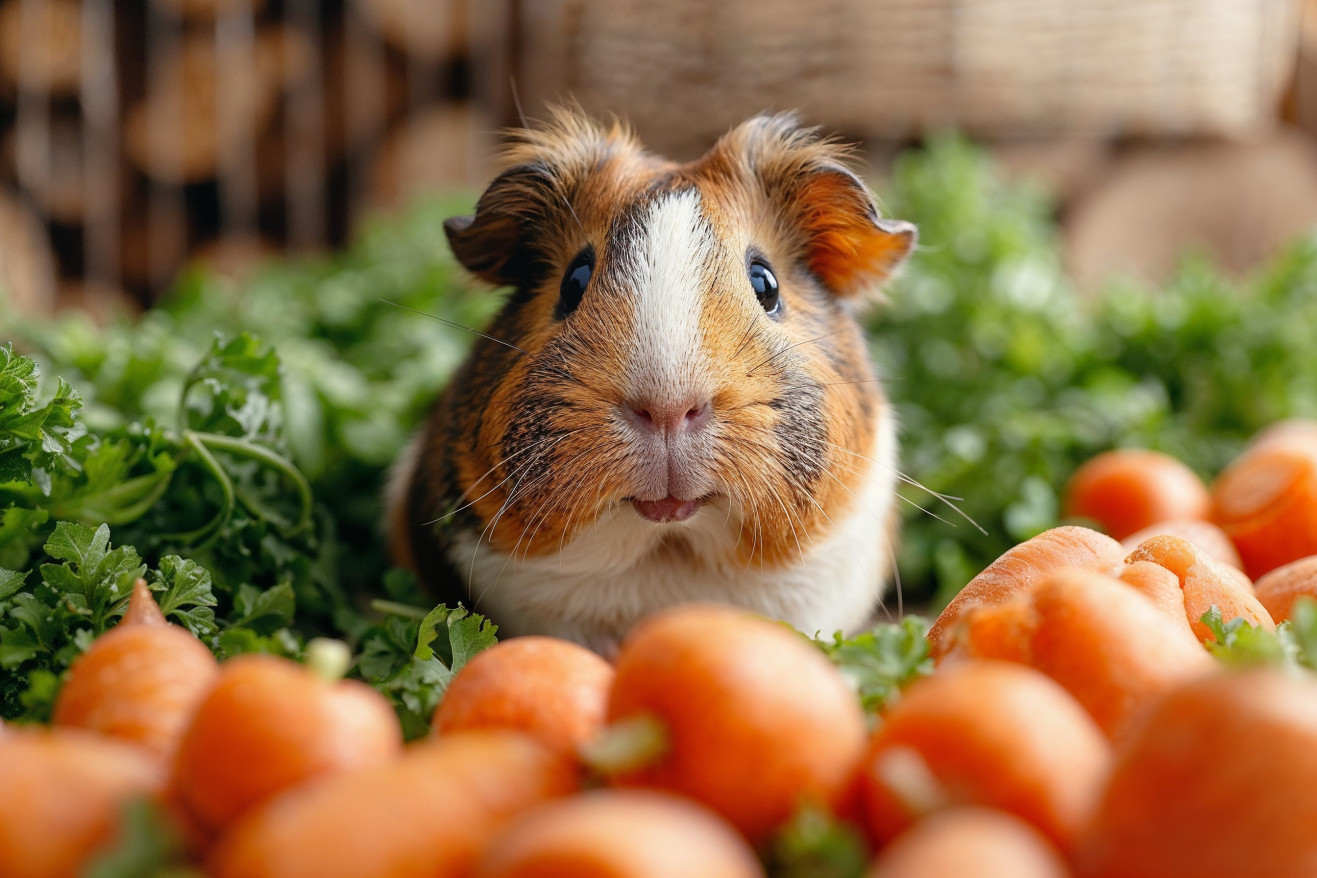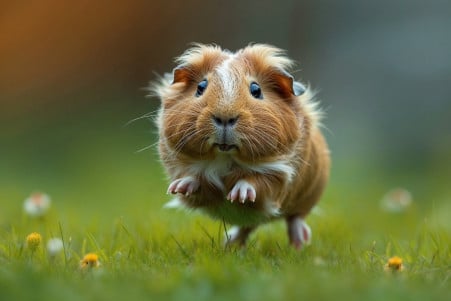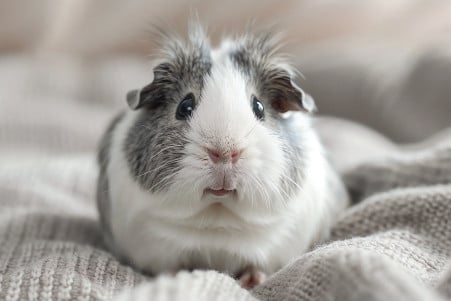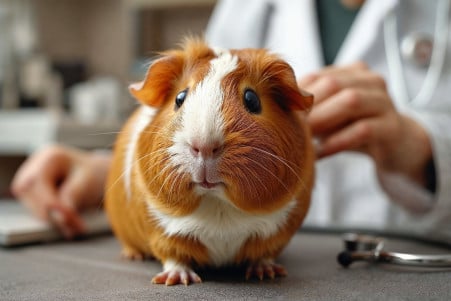How to Tell If Your Guinea Pig Is Happy: What Their Happiness Behaviors Mean
28 January 2024 • Updated 30 January 2024

All guinea pig owners can pick up on the subtle signs that their pet is happy. Some of the most common signs of a happy guinea pig include “popcorning” (jumping in the air), wheeking (vocalizing in a high-pitched manner), interacting with other guinea pigs, and eating normally. In addition, bright, clear eyes and a nose that’s clean and free of any discharge are signs of a happy guinea pig.
To help you better understand your guinea pig’s emotional life, this article will explore research from a variety of fields, including veterinary medicine, animal behavior, and pet care. This will involve looking at research that has investigated guinea pig behaviors, vocalizations, and the impact of their environment on their well-being.
The hope is that by bringing this information together, you’ll be able to get a more complete picture of what happiness looks like for your guinea pig.
What are the most reliable indicators of happiness in guinea pigs?
Behavioral Signs of Happiness
If your guinea pig is leaping into the air in a behavior called ‘popcorning,’ that’s a pretty obvious sign that your pet is happy. This happy dance is a sign of a happy and healthy guinea pig, and it’s especially common in younger guinea pigs, according to GuineaDad.
Social interactions can also tell you a lot about how your pet is feeling. The RSPCA says that signs of a happy guinea pig include living peacefully with other guinea pigs, grooming each other, and generally enjoying the company of other guinea pigs.
Another way to tell if your guinea pig is happy is by looking at their eating habits. Petco says that a healthy guinea pig will be excited to eat and will be active in their cage.
That said, it’s important to make sure that you’re not misinterpreting your guinea pig’s behavior. For example, if your guinea pig is being too still or too quiet, it may not be a sign of relaxation, but instead a sign of stress or illness.
By learning to recognize these signs in the right context, you can make sure that you’re meeting their emotional needs and keeping them healthy.
Understanding Guinea Pig Sounds
Guinea pigs are highly vocal animals and use a variety of sounds to communicate how they are feeling. For example, Oxbow Animal Health notes that guinea pigs often make a high-pitched squeal called wheeking when they are excited or anticipating a treat.
Meanwhile, ‘purring’ is a sign of happiness, although its meaning can change based on the pitch and the guinea pig’s body language, according to The Spruce Pets. Another sound that indicates happiness is ‘chutting,’ which is a sound of joy and satisfaction, especially when the guinea pig is interacting with its owner or other guinea pigs.
On the other hand, ‘teeth chattering’ and ‘hissing’ are signs of annoyance or discomfort and suggest that the guinea pig feels threatened or stressed. Meanwhile, ‘shrieking’ is a sign of distress and indicates that the guinea pig is scared or in pain and needs the owner to intervene. It’s important to listen to these sounds in the context of the guinea pig’s other behaviors to accurately understand what they are trying to communicate.
If you listen to these sounds over time, you may notice that your guinea pig makes the same sounds when they are in the same mood. This can help you better understand what your guinea pig is trying to tell you and make it easier for you to respond to their needs.
By learning to recognize these sounds, you can help your guinea pig feel safe and happy, which will have a big impact on their quality of life.
Creating a Happy Guinea Pig Environment
The environment in which a guinea pig lives is one of the most important factors in its happiness. The NC3Rs study found that a well-designed environment that includes plenty of space for exercise and stretching, soft bedding to prevent skin sores, and a variety of hiding places to help guinea pigs feel safe and secure is essential to their well-being.
According to FOUR PAWS International, these hiding places also fulfill guinea pigs’ natural instincts to hide and play, which can reduce stress and encourage natural behaviors.
Diet also plays a major role in emotional well-being. Guinea pigs are unable to synthesize vitamin C and need to get it from their diet, which should include plenty of fresh fruits and vegetables. The NC3Rs study found that giving guinea pigs a consistent diet that includes their favorite foods, such as carrots and hay, can lead to positive behaviors like ‘wheeking’ and ‘popcorning,’ which are signs of happiness and good health.
In addition, mental stimulation through enrichment is important. The RSPCA suggests that guinea pigs be given items like tunnels and untreated wooden toys to keep them mentally stimulated and help maintain their dental health. Keeping environmental conditions stable, including maintaining a temperature-controlled environment and a regular light-dark cycle as recommended by the NC3Rs, will help ensure guinea pigs are physically comfortable and that their needs are in line with their natural circadian rhythms.
When these environmental needs are met, guinea pigs can be emotionally healthy and ready to interact with their human caregivers.
How Human Interaction Impacts Guinea Pig Happiness
Human interaction is a major factor in guinea pig happiness. A study in ScienceDirect found that guinea pigs experienced lower stress and higher enrichment levels when they had the ability to retreat during human interactions, like those that occur in animal-assisted therapy. This suggests that while guinea pigs like human interaction, they also need to have the option to get away in order to feel safe and happy.
Proper handling is also important for building a positive relationship. Kind, predictable interactions can help build trust, which is important for a guinea pig’s mental health. A study in PMC found that guinea pigs can help improve children’s social skills when they’re involved in animal-assisted activities in a school setting. This shows that there are potential benefits to positive human interaction for guinea pig happiness.
That said, it’s important to make sure that guinea pigs’ boundaries are respected and that they have a safe place to retreat. Doing so will help reduce their stress and allow them to interact with humans on their own terms, leading to more meaningful and enjoyable interactions for both the guinea pig and the person.
With the right care and understanding, the relationship between humans and guinea pigs can be mutually beneficial, leading to improved mental health for the animal and potentially impacting their eating habits and overall well-being.
Diet and the Emotional Well-Being of Guinea Pigs
The emotional well-being of guinea pigs is directly related to their diet, and a well-rounded diet is necessary for their overall happiness. The RSPCA explains that guinea pigs need a diet that includes good-quality hay, fresh grass, and pellets that are high in Vitamin C, as guinea pigs can’t produce this important vitamin on their own.
Nutritional deficiencies, especially a lack of Vitamin C, can lead to changes in behavior and mood, which shows the importance of a diet that meets all of their nutritional requirements.
LafeberVet’s research explains that guinea pigs develop food preferences early in life, and if their diet is changed suddenly, they may refuse to eat, leading to stress and a decrease in happiness.
This means that it’s important to introduce a variety of foods to guinea pigs when they are young. If a guinea pig is having trouble with their diet, they may show signs of distress, including a lack of appetite and changes in fecal output, as shown in a study on guinea pig gastrointestinal research published in MDPI.
However, if you work with a vet to change your guinea pig’s diet when these signs first appear, you can help ensure that they are both physically and emotionally healthy and happy. With the right nutrients and a consistent diet, guinea pigs can reach a level of happiness that is both satisfying and fulfilling.
Conclusion: Guinea Pig Happiness
In our exploration of guinea pig happiness, we have learned that guinea pigs show happiness through energetic behaviors like ‘popcorning’, a range of vocalizations including happy ‘wheeking’, and the calm of social grooming.
A safe and enriched environment that includes a large cage and plenty of toys and activities is important for their sense of safety and happiness. How humans interact with and handle guinea pigs also plays a role in their happiness and trust. Finally, a healthy diet that includes Vitamin C is important for their physical and emotional well-being.
It is important to understand and meet these needs for the well-being of these sweet animals. We hope that guinea pig parents will watch their pets closely and learn to understand their behaviors and sounds with compassion and understanding. In doing so, they will help ensure their pets’ happiness and strengthen their bond.
Taking care of a happy guinea pig is rewarding for both the pet and the owner and is a privilege as well as a responsibility. We hope that you enjoy every moment of your happy times with your guinea pig friends.


